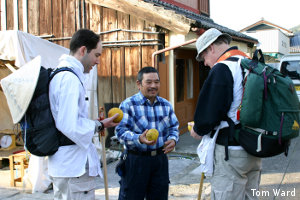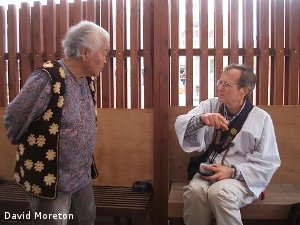

{Shikoku Hachijūhachikasho Meguri}
--WALKING--
--SETTAI--


--WALKING--
--SETTAI--
 Throughout your walk people will try to give you things. This is called settai, or Osettai, which is a little more formal and the way you will almost always hear it. Settai, in Japanese, means 'gift/offering,' or as a verb, 'to give/to offer,' but this doesn't refer to the offering of just material goods; it includes the gift of anything, including a meal, or some service done for you or on your behalf. The items people will try to give you include food items, full meals, canned drinks, beer, money, nōkyō stamps at the temples, lodging for the night, towels, clothing, offers of a ride in their car, and more.
Throughout your walk people will try to give you things. This is called settai, or Osettai, which is a little more formal and the way you will almost always hear it. Settai, in Japanese, means 'gift/offering,' or as a verb, 'to give/to offer,' but this doesn't refer to the offering of just material goods; it includes the gift of anything, including a meal, or some service done for you or on your behalf. The items people will try to give you include food items, full meals, canned drinks, beer, money, nōkyō stamps at the temples, lodging for the night, towels, clothing, offers of a ride in their car, and more.
In my opinion, this is not something that should be taken lightly. People offer you settai because you are a henro and, for whatever particular reason, that means something to them. You, as a henro, are a symbol to the giver and in giving you something they are giving something to your pilgrimage. They are giving something to the pilgrimage in general. By giving you settai, they are, in some way, now participating in your pilgrimage. And through your pilgrimage, they are participating in the pilgrimage itself. You, the receiver, are only an intermediary in their vicarious participation in your journey, and in the pilgrimage itself.
When offered settai, you are under an obligation to accept. Of course, i don't include offers of car rides in this as that is contrary to what you, as a walker, are trying to do. But, when offered, accept the gift graciously. Thank the person sincerely and with the understanding that the true gift isn't the material item changing hands, but the spiritual gift that the material object represents. The object that changed hands wasn't really the gift. The service that was performed for you, or on your behalf, wasn't really the gift. The true gift was the chance to participate in the recipoical acts of giving and receiving.
 The most significant settai that i have heard of was given to Karin Muller, as explained in her book Japanland: A Year in Search of Wa. When she walked the pilgrimage, she chose to do so in the very early part of the year, before it warmed up, and before the snows disappeared. She paid for that decision by coming down with a solid case of pneumonia — a case bad enough to land her in the local hospital. As she explains, she knew full well that her US health insurance wouldn't cover the hospital, medical, and doctor fees, so she checked herself out after a week; against the doctor's wishes.
The most significant settai that i have heard of was given to Karin Muller, as explained in her book Japanland: A Year in Search of Wa. When she walked the pilgrimage, she chose to do so in the very early part of the year, before it warmed up, and before the snows disappeared. She paid for that decision by coming down with a solid case of pneumonia — a case bad enough to land her in the local hospital. As she explains, she knew full well that her US health insurance wouldn't cover the hospital, medical, and doctor fees, so she checked herself out after a week; against the doctor's wishes.
In Japan, the hospital doesn't provide food for their patients; it is expected that family members will come by and provide anything the patient needs, including food. Yet, even though she had no family or friends there, each day, whenever she woke up, miraculously enough there was food on a tray by the bed. When she made it clear that she couldn't afford the charges and was therefore going to check herself out, her belongings disappeared, only to reappear the next day with everything washed, ironed, sewed and repaired as needed, and repacked exactly as it had been when she checked in.
To make a long story short, when she did check out, she met the doctor and all of the nurses. After several rounds of deep bows and many thanks, she worked up the courage to ask how much she owed the hospital for all of the food and the services. Her answer ... "Osettai." If you ever wonder about the current state of the world, the seemingly universal anger and indifference, the people who refuse to talk to, accept, or help anyone not from their creed, sect, nationality, political party, etc. remember this example.
As i have said on other pages of this site, the people of Shikoku are the most amazingly wonderful people. As a henro, you will be watched over, taken care of, and helped in any dozens of different ways. You will be offered settai by students, shopkeepers, businessmen & women, housewifes, children, and priests. There seems to be no discrimination when it comes to henro. If you are a henro on the henro trail, you will, at some point, find yourself on the receiving end of settai. Please treat the occasion appropriately.
I use this phrase all the time, but "in the old days," it was tradition to offer one of your name cards to the person giving you settai. Over the years, though, more and more people are telling me "thanks, but i don't need one." Most people aren't looking for recognition for their gift, and this is particularly true if all they are offering is ¥100, a can of juice, or the like. Today i don't even offer a name slip in these cases unless my gut tells me they are hoping to get one. You have to play this by ear.
In the end, all that really matters is the manner in which you received the gift. If received well, the giver is satisfied (a slight bow in Japan goes a very looong way). Accept whatever is offered, then, if you really don't intend to use/eat what was given to you, feel free to pass it on at a later time to someone else as settai from you.